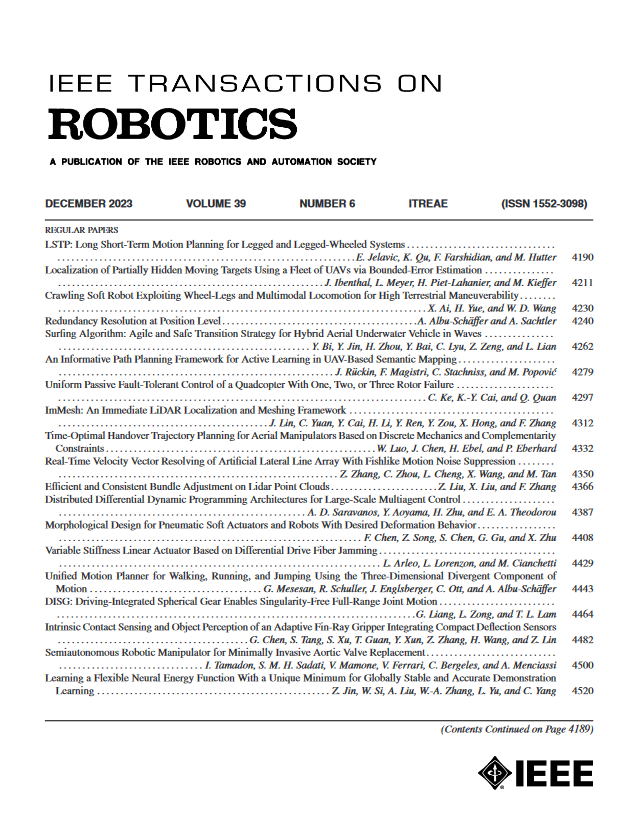面向可扩展多机器人控制:分布式MPC中的快速策略学习
IF 10.5
1区 计算机科学
Q1 ROBOTICS
引用次数: 0
摘要
分布式模型预测控制(DMPC)是实现多机器人系统最优协同控制的有效方法。然而,实时DMPC的实现依赖于数值优化工具来周期性地在线计算局部控制序列。该过程对计算量要求高,并且缺乏大规模非线性模型的可扩展性。本文提出了一种新的基于分布式学习的预测控制框架,用于可扩展的多机器人控制。与计算开环控制序列的传统DMPC方法不同,我们的方法以计算快速高效的分布式策略学习算法为中心,该算法无需使用数值求解器即可为MRS生成显式闭环DMPC策略。策略学习在每个预测间隔内通过在线分布式参与者批评实现增量和向前执行。控制策略以水平后退的方式连续更新,实现了快速有效的策略学习,并保证了闭环的稳定性。学习到的控制策略可以在线部署到具有不同机器人规模的MRS中,增强了大规模MRS的可扩展性和可移植性。此外,我们扩展了我们的方法,通过力场启发策略学习方法来解决多机器人安全学习的挑战。我们通过大规模轮式机器人和多旋翼无人机协同任务的大量实验验证了我们方法的有效性、可扩展性和效率。我们的研究结果证明了DMPC策略在MRS中的快速学习和部署,规模高达10,000个单位。本文章由计算机程序翻译,如有差异,请以英文原文为准。
Toward Scalable Multirobot Control: Fast Policy Learning in Distributed MPC
Distributed model predictive control (DMPC) is promising in achieving optimal cooperative control in multirobot systems (MRS). However, real-time DMPC implementation relies on numerical optimization tools to periodically calculate local control sequences online. This process is computationally demanding and lacks scalability for large-scale, nonlinear MRS. This article proposes a novel distributed learning-based predictive control framework for scalable multirobot control. Unlike conventional DMPC methods that calculate open-loop control sequences, our approach centers around a computationally fast and efficient distributed policy learning algorithm that generates explicit closed-loop DMPC policies for MRS without using numerical solvers. The policy learning is executed incrementally and forward in time in each prediction interval through an online distributed actor–critic implementation. The control policies are successively updated in a receding-horizon manner, enabling fast and efficient policy learning with the closed-loop stability guarantee. The learned control policies could be deployed online to MRS with varying robot scales, enhancing scalability and transferability for large-scale MRS. Furthermore, we extend our methodology to address the multirobot safe learning challenge through a force field-inspired policy learning approach. We validate our approach's effectiveness, scalability, and efficiency through extensive experiments on cooperative tasks of large-scale wheeled robots and multirotor drones. Our results demonstrate the rapid learning and deployment of DMPC policies for MRS with scales up to 10 000 units.
求助全文
通过发布文献求助,成功后即可免费获取论文全文。
去求助
来源期刊

IEEE Transactions on Robotics
工程技术-机器人学
CiteScore
14.90
自引率
5.10%
发文量
259
审稿时长
6.0 months
期刊介绍:
The IEEE Transactions on Robotics (T-RO) is dedicated to publishing fundamental papers covering all facets of robotics, drawing on interdisciplinary approaches from computer science, control systems, electrical engineering, mathematics, mechanical engineering, and beyond. From industrial applications to service and personal assistants, surgical operations to space, underwater, and remote exploration, robots and intelligent machines play pivotal roles across various domains, including entertainment, safety, search and rescue, military applications, agriculture, and intelligent vehicles.
Special emphasis is placed on intelligent machines and systems designed for unstructured environments, where a significant portion of the environment remains unknown and beyond direct sensing or control.
 求助内容:
求助内容: 应助结果提醒方式:
应助结果提醒方式:


